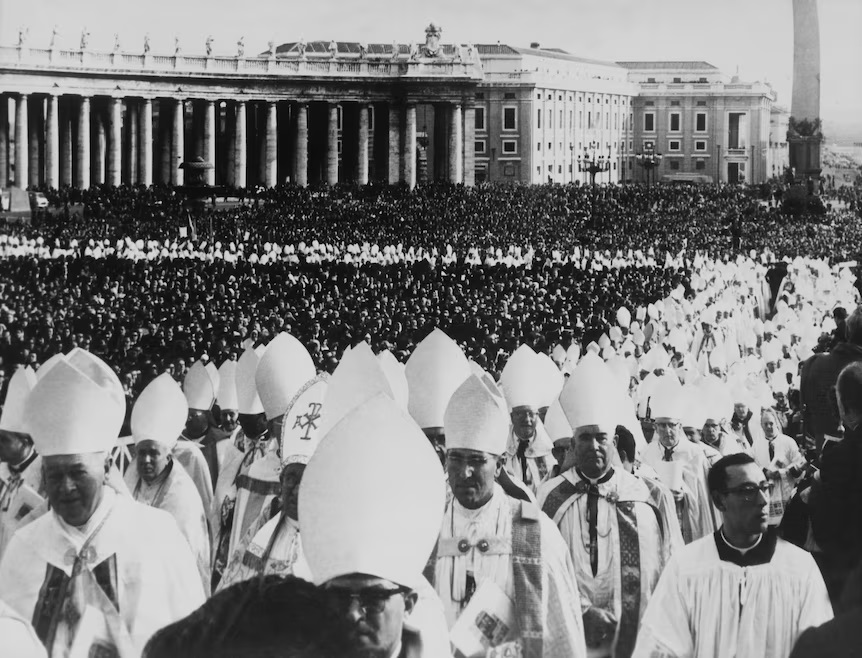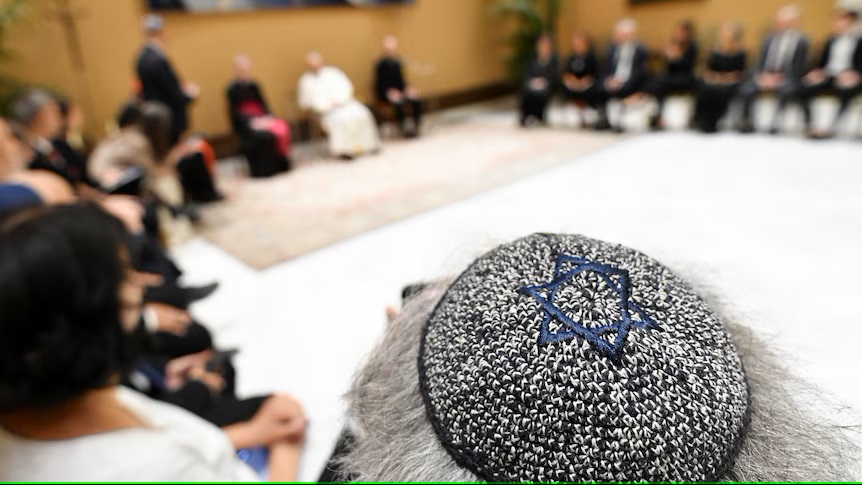The Catholic Church and the Jewish people in turbulent times: Reflections on “Nostra aetate” after 60 years
Pictured left: Pope Francis meets with a delegation of World Union for progressive Judaism at Paul VI Hall on May 15, 2024 in Vatican City. (Photo by Vatican Media via Vatican Pool / Getty Images)
The Catholic Church maintains two separate departments, called “dicasteries” — one for interreligious dialogue (which includes dialogue with Islam and other world religions), and another for dialogue with Judaism and the Jewish people (which is actually part of the dicastery for promoting Christian unity). There are historical reasons for this, and you sometimes hear it said that the Catholic Church’s relationship with Judaism is in fact its first “ecumenism” — namely, a dialogue with one’s own, rather than with others outside the faith.
This would suggest a built-in tension within Catholicism’s understanding of its origins and its eventual parting of ways with Judaism. It also says something about the Catholic Church’s own perception of the nature and quality of its dialogue with Judaism and the Jewish people — a fact that is both appreciated and understood as such by its Jewish dialogue partners.
Why is this important? On 28 October 2025, the Catholic Church will celebrate 60 years since the promulgation of its declaration on non-Christian religions, Nostra aetate (named after the first two Latin words with which the document begins, “In our time …”). Nostra aetate was one of the seven last documents of the most significant council of the Catholic Church in the last century, which spanned three years (1962-1965) and two popes (John XXIII and Paul VI).
As a document, Nostra aetate contains the teaching of the Second Vatican Council, which marked a significant turning point in the way Catholics related to people of non-Christian religious traditions. We might describe this shift as being from an attitude of suspicion to respect; from defensiveness to openness; from distance to partnership. Today, the Church encourages interfaith dialogue and seeks to journey with people of other religious communities.
It is worth asking, then, how the Catholic Church currently understands its relationship with Judaism and the Jewish people — particularly in light of ever-increasing hostilities in the world, some of which have religious overtones.
The ambiguities of “Nostra aetate”
Consider the third paragraph of Nostra aetate, which states:
Since in the course of centuries not a few quarrels and hostilities have arisen between Christians and Moslems, this sacred synod urges all to forget the past and to work sincerely for mutual understanding and to preserve as well as to promote together for the benefit of all mankind social justice and moral welfare, as well as peace and freedom.
Somewhat diplomatically, Nostra aetate acknowledges the tumultuous and violent clashes in history between territories under Christian and Muslim rule, but now seeks to put that history firmly in the rear-view mirror of the past and usher in a new, more harmonious, forward-looking relationship of working together towards peace and justice. No longer warfare, but welfare is the clarion call. One might say that the papacy of Francis, in particular, has heeded this call with his series of visits to the Middle East since 2019.
Another picture emerges when we look at the following paragraph. (And we should remember at this point that Nostra aetate was originally conceived as a document dealing with the Catholic Church’s relationship with Judaism and the Jewish people). It is a much longer paragraph and is almost always held up as the signal moment in which the Catholic Church turned its back on centuries of the teaching of contempt towards Judaism and Jewish people. But the paragraph is filled with ambiguities. To take just one of them:
Although the Church is the new people of God, the Jews should not be presented as rejected or accursed by God, as if this followed from the Holy Scriptures.
The Catholic Church no longer holds all Jews responsible for the death of Christ. Yet it does so by mentioning, with unconcealed regret, the Jewish rejection of Jesus as the Christ and Saviour. It is also as the “new people of God” that the Catholic Church comes to regard, almost as a reminder to itself, that there are still people today who adhere to the “Ancient Covenant” and who can claim physical rather than spiritual descent from Abraham, the Patriarchs, and even the scriptures to which the Catholic Church still turns.
Seeing these two paragraphs juxtaposed in the same document, it is hard not to be struck by the difference in their tone. One paragraph almost rushes to sweep the deep-seated hostilities of centuries past under the rug of history and to turn a corner towards the better days that lie ahead. But in such brevity the Catholic Church leaves unarticulated real theological differences that might otherwise be stumbling blocks to working together.

The closing ceremony of the Second Vatican Council in Saint Peter’s Square on December 9, 1965. (Photo by Keystone-France / Gamma-Keystone via Getty Images)
The fourth paragraph, by contrast, is more lengthy and tries to honestly articulate the ambivalent relationship the Catholic Church has had with the Jewish people, and how it struggles to overcome the hurdles in its own understanding of Christianity’s emergence from Judaism, as well as the fact that the Jewish have continued to say “no” to belief in Jesus as the Son of God.
What is noteworthy about the fourth paragraph of Nostra aetate, after nearly 60 years, is the honesty with which the Catholic Church understands the need to begin the journey of a new type of relationship with the Jewish people, but not without also placing all its theological cards on the table. It does not, in this instance, attempt to sweep their differences under the carpet. The Church recognises that it must decry antisemitism in all its forms, but it also acknowledges that a much longer journey must commence. Mutual understanding and respect can only come about after a concerted and long-term investment in “biblical and theological studies as well as … fraternal dialogues”.
A document “for our times”
Conscious that Nostra aetate was meant to be a document “for our times”, I am only too aware what a luxury it is to analyse these words, important though they are, at a time when words themselves have been weaponised. Not only that, in Australia we seem to have imperceptibly moved past a tipping point when synagogues are being set alight and Jewish neighbourhoods are being vandalised and terrorised. Not only are such acts to be condemned in no uncertain terms and the perpetrators brought to justice — in order to arrest the further fraying of communal bonds, we all need to pull together.
With 1.2 billion Catholics in the world, is there not more that we Catholics can do to support Jewish communities as they confront the rise in antisemitism? Why should Jews — who make up only 0.2 per cent of the world’s population, who have not yet reached their pre-Holocaust replenishment numbers — be left to bear the burden of fighting this global scourge of hatred?
Antisemitism has particular relevance to Christians, given the legacy of the Church’s complex and shameful history of antagonism towards and persecution of Jews. This history includes the spread of antisemitic thought-patterns, stereotypes and toxic tropes — now repudiated by denominations, but which continue to be manipulated by extremists on both sides of the ideological divide: such as “demon” Jews (St. John Chrysostom), “blood thirsty” Jews (the medieval blood libel), “perfidious” Jews (the pre-1959 Good Friday liturgy), “Christ-killers” (pre-Vatican II catechetics), perpetual exiles from their homeland as a sign of divine punishment (St. Augustine), and so on.
The challenge remains, then, for Christians to own the dark chapters of their history — just as many nations do when they recognise the sins committed against Indigenous peoples — and to decisively transform it.
We also need to reclaim the lost art of engaging in dialogue despite our differences. Rather than retreat into the safety of echo chambers, in which it easy cancel out the noise of those we disagree with most, we need to recover what a generation ago seemed more willing to risk: embarking on dialogue whenever our differences most threatened to divide us.
I write this at a time when, for Jewish dialogue partners with the Catholic Church, a number of recent statements and acts on the part of Pope Francis have been puzzling — particularly in light of six decades years of sustained, constructive, even critical dialogue that seemed to have moved the two faiths closer to one another. This is not just a sign that Catholic-Jewish dialogue is robust enough to share hard truths. It also shows that Jewish dialogue partners take the Catholic documents and statements more seriously than some Catholics do. They remind Catholics that dialogue takes real commitment and cannot just be mere words on a page.
The importance of interreligious dialogue
As we turn to a whole-society approach to healing communities, rebuilding trust and supporting one another, I believe that interfaith dialogue can continue to play a role in this. The text of Nostra aetate can still be instructive, as a case study from 60 years ago, when at least two parallel strategies towards interreligious dialogue were set in motion:
- The Catholic Church wanted to boldly turn a corner on past grievances and look hopefully to a new model of working together for the common good.
- Perhaps willing to risk more, the Church chose, no matter how haltingly, to enter into a long-term process of open and honest dialogue and learning. The Church was open and honest about what it believes to be true, but it was also open to setting in motion a learning trajectory, which would ultimately lead to new insights and changed practices — and, indeed, it was only after the Catholic Church began to earnestly engage with Jewish scholars on the most up-to-date scholarship about Christianity’s and rabbinic Judaism’s shared origins that Catholic liturgical practice, religious education, even its homilies began to change.
We cannot ignore that the trickle-down reception of conciliar teaching is slow. But there are encouraging signs that real progress continues to be made. I have just returned energised from a gathering of national councils of Christians and Jews in Melbourne which, coupled with a visit from an international delegation of Christians and Jews, examined the question of whether dialogue still has relevance between our two communities. Grateful for the opportunity to share difficult moments together, this gathering of 70 people resoundingly affirmed that dialogue is more important now than ever.
While ambiguities and difficulties in the dialogue between Jews and Catholics persist, Nostra aetate is nonetheless a testament that real dialogue takes time and hard work. One doesn’t walk away when the going gets tough. Rather, dialogue was meant to help us deal with moments such as these. For, what is the point of dialogue if it only succeeds when the going is good?
By Emmanuel Nathan
Published on the ABC – Religion & Ethics website.


